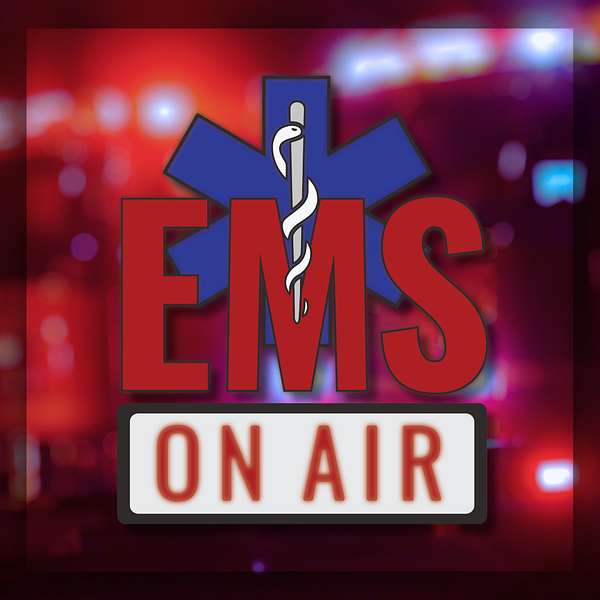
EMS on AIR Podcast
EMS on AIR is an education and entertainment podcast designed to keep healthcare providers safe, informed, and prepared. The EMS on AIR Podcast was originally launched in response to the COVID-19 pandemic as a way to communicate efficiently and directly with EMS personnel. Now, we’ve started branching out to all things healthcare but still tailored with the national EMS audience in mind. This podcast has begun to transform into a bridge between subject matter experts, the most recent data, and the EMS providers who make a difference every day in the field.
The EMS on AIR Podcast is hosted by Geoff Lassers and Dr. Robert Dunne.
Geoff Lassers began his career as a first responder in 2002. Since then, he has earned a depth of experience as a professional firefighter, paramedic, EMS instructor, and in the hospital as an ED tech. Geoff has been a professional firefighter/paramedic and EMS instructor with the West Bloomfield Fire Department since 2004. In 2020, the EMS on AIR Podcast was launched to provide up-to-date information to the local, state, and national EMS community regarding the COVID-19 pandemic, as well as express best practices. Since then, the EMS on AIR Podcast has expanded to all topics related to prehospital care.
Robert Dunne, M.D., FACEP, FAEMS, is an Emergency Medicine and EMS physician located in Detroit, Michigan. Dr. Dunne is currently the EMS Medical Director of the Detroit Fire Department, as well as a professor of Emergency Medicine at Wayne State University, and directs the School of Medicine’s pre-hospital programming, including Emergency Medical Services, Preparedness, EMS Research and more. He is also program director of the Emergency Medical Services fellowship. Additionally, Dr. Dunne is the elected medical director of the Detroit East Medical Control Authority, the local version of the state-designated entity that supervises all pre-hospital care in Detroit and eastern Wayne County.
EMS on AIR Podcast
S2:E38 - "Stroke Systems of Care and the Urban Environment - A discussion with Dr. Christopher T. Richards, MD, MS, FAEMS, FACEP." Recorded June 14, 2021
In this episode, we welcome Dr. Christopher Richards MD, MS, FAEMS, FACEP to the show. Dr. Richards is an emergency medicine and EMS physician in the Division of EMS in the Department of Emergency Medicine at the University of Cincinnati, as well as a member of the UC Stroke Team. He is the EMS medical director of several EMS agencies in southwest Ohio, as well as the UCHealth Mobile Stroke Unit. He collaborates nationally as a committee chair of the Prehospital Guidelines Consortium, an Advisory Board member of the American Stroke Association, and as a representative to the National Institute of Neurological Disorders and Stroke (NINDS) Brain Attack Coalition.
The doc is here to provide us with his perspective regarding the development of stroke systems of care in the urban environment. Doc is an ED physician with a deep background in a variety of EMS systems. Most recently, Doc was a co-author of the 2021 Recommendations for Regional Stroke Destination Plans in Rural, Suburban, and Urban Communities from the Prehospital Stroke System of Care Consensus Conference, which is the focus of today’s episode. This landmark consensus provides local and regional EMS agencies and stroke advisory committees with guiding principles and recommendations for how to integrate the elements of a stroke system of care in three key regional settings: urban, suburban, and rural settings. It also takes into account the differences in resources, hospital certifications, geography, and population density. Additionally, it seeks to inform or update EMS about new models and systems of acute ischemic stroke care, especially mechanical thrombectomy for large vessel occlusion stroke, and how they affect their stroke systems of care. You can find a link to the 2021 Recommendations for Regional Stroke Destination Plans in Rural, Suburban, and Urban Communities in the episode description.
To maximize the power of the recommendations, the AHA/ASA produced a very cool and very useful website full of resources and information directly related to helping EMS develop and or fortify their stroke systems of care. I highly recommend you visit www.Stroke.org/stroketransportplans and use it to consider evolving the stroke system of care in your community.
During this episode, Dr. Richards will help us appreciate what is at stake for stroke patients. From there, we dive into the meat of the discussion, which is a focus on the nuances, advantages, and disadvantages of the urban environment regarding EMS and stroke. Finally, Doc will give his recommendations regarding how EMS systems should use the contents of this paper to improve their Stroke Systems of Care and strengthen their stroke chain of survival.
Please keep emailing your questions, comments, feedback and episode ideas to the EMS on AIR Podcast team by email at QI@OCMCA.org. Visit EMSonAIR.com for the latest information, podcast episodes and other details. Follow us on Instagram @EMSOnAIR.
Contact the episode participants:
Geoff Lassers, Paramedic I/C, AAS
Host, EMS on AIR Podcast
Qi@ocmca.org
Christopher T. Richards, MD, MS, FAEMS, FACEP
Assistant Professor
Division of Emergency Medical Services
Department of Emergency Medicine
University of Cincinnati College of Medicine
christopher.richards@uc.edu